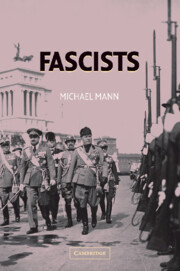Book contents
- Frontmatter
- Contents
- Preface
- 1 A Sociology of Fascist Movements
- 2 Explaining the Rise of Interwar Authoritarianism and Fascism
- 3 Italy: Pristine Fascists
- 4 Nazis
- 5 German Sympathizers
- 6 Austro-Fascists, Austrian Nazis
- 7 The Hungarian Family of Authoritarians
- 8 The Romanian Family of Authoritarians
- 9 The Spanish Family of Authoritarians
- 10 Conclusion: Fascists, Dead and Alive
- Appendix
- Notes
- Bibliography
- Index
5 - German Sympathizers
Published online by Cambridge University Press: 05 June 2012
- Frontmatter
- Contents
- Preface
- 1 A Sociology of Fascist Movements
- 2 Explaining the Rise of Interwar Authoritarianism and Fascism
- 3 Italy: Pristine Fascists
- 4 Nazis
- 5 German Sympathizers
- 6 Austro-Fascists, Austrian Nazis
- 7 The Hungarian Family of Authoritarians
- 8 The Romanian Family of Authoritarians
- 9 The Spanish Family of Authoritarians
- 10 Conclusion: Fascists, Dead and Alive
- Appendix
- Notes
- Bibliography
- Index
Summary
The Nazis were able to seize power because a shrewd leadership was able to mobilize three essential power resources: the activism and violence of Nazi militants (discussed in the previous chapter), the votes of one-third of the German electorate, and the ambivalence of German elites concerning Weimar democracy. Unlike the Italian fascists, the Nazis seriously and successfully contested elections. Over a third of Germans voted for them, and this enabled them to reach the very brink of power by constitutional means. But, like the Italian fascists, the Nazis actually seized that power with help from the country's elites. I first consider the breadth and the motivations of the electoral support. For the sake of brevity, I focus on the main period of electoral success, after 1930. I consider the mass ideological power resources of the Nazis: what electoral message the Nazis tried to put across and how voters perceived it.
NAZI ELECTORAL STRATEGY
Some say that the Nazis would do anything for votes; not ideology but opportunism dominated their electioneering. This is part of the tradition of not taking fascists seriously. Childers (1990) says that leaflets and speeches were tactically aimed at specific interest groups, with policies opportunistically tailored to each. Indeed, Hitler's book Mein Kampf openly reveals contempt for the masses and explains how to manipulate them and their hatreds. As he once explained to his confidants: “Comprehension is a shaky platform for the masses. The only stable emotion is hate” (Kershaw 1991: 51).
- Type
- Chapter
- Information
- Fascists , pp. 177 - 206Publisher: Cambridge University PressPrint publication year: 2004

